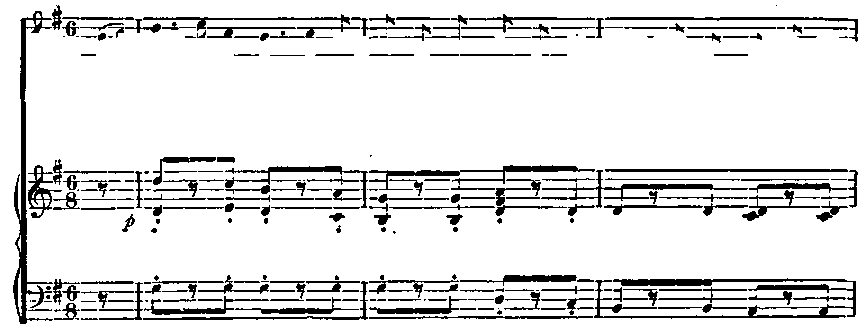Familiar Songs - Their Authors & Histories
300 traditional songs, inc sheet music with full piano accompaniment & lyrics.
| Share page | Visit Us On FB |
|
THE JOLLY YOUNU WATERMAN. I57
THE JOLLY YOUNG WATERMAN.
Charles Dibdin, the great English sea-song writer, was also an actor and a dramatist. But his other talents were overshadowed by the one for which he stands preeminent. He was born at Southampton, England, in 1745, and was educated with a view to the church. When a boy, he sang in Winchester, and when sixteen years old, in London. He produced an opera called "The Shepherd's Artifice," which was brought out at Covent Garden Theatre, of which he became musical manager seventeen years later. He wrote for the London stage with great industry for twenty years, and he says that for all that work, which included one hundred operas, he received, including his salaries and several benefits, only £5,500. Much of this illiberality he charges upon Garrick. In 1791, he gave the first of a series of entertainments of his own invention. They were entitled " The Whim of the Moment," and consisted of songs, recitations, etc. He built a little theatre in the Strand, called " Sans Souci." It was a gem; and Dibdin alone planned it, painted and decorated it, and wrote for its stage both the words and music of the recitations and songs which he gave there to an " organized piano-forte," which he had invented. It proved an immense success, and song after song, of the thousand which he wrote, there awoke echoes that were never to die. Still, Dibdin had but little scientific musical education, and could not write accompaniments for bis own exquisite airs, although he sang them gloriously. He somewhere says: " Those who get at the force and meaning of the words, and pronounce them as they sing, with the same sensibility and expression as it would require in speaking, possess an accomplishment in singing beyond what all the art in the world can convey; and such, even when they venture upon cantabiles and cadences, will have better, because more natural, execution than those who fancy they have reached perfection in singing, by stretching and torturing their voices into mere instruments."
In the introduction to his collected songs, he says: " A friend of mine, one evening, dropped into a coffee-house, where a number of literary jurymen were holding an inquest over my murdered reputation. He humored the jest, and, before he had finished, proved to the satisfaction of every one that' Poor Jack' was a posthumous work of Dr. Johnson's; that the 'Eace Horse' was written by the jockey who rode the famous < Flying Childers,' and that ' Blow high, Blow low/ was the production of Admiral Keppel, who dictated the words to his secretary, as he lay in his cot, after the memorable battle of the 27th of July, ' waiting for the French to try their force with him handsomely next morning.'"
Air, as well as words, of the "Jolly Young Waterman," are Dibdin's, and the song was produced in his entertainment of "The Waterman." Dibdin died July 25, 1814.
This piece was one of the most famous sung by Braham and Incledon. ^£-gd^z±zp—$
1. And did you not hear of a jol - ly young \va - ter -man, Who at Black - fri - ar's bridge
2. What sights of fine folks he oft row'd in his wher-ry;'Twas clean'd out so nice, and so
3. And yet, but to see how strangely things hap-pen, As he row'd a - long, thinking of |
||
 |
||